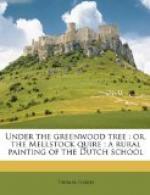Dick had said nothing, and the tranter little, on this episode of the morning; for Mrs. Dewy at breakfast expressed it as her intention to invite the youthful leader of the culprits to the small party it was customary with them to have on Christmas night—a piece of knowledge which had given a particular brightness to Dick’s reflections since he had received it. And in the tranter’s slightly-cynical nature, party feeling was weaker than in the other members of the choir, though friendliness and faithful partnership still sustained in him a hearty earnestness on their account.
CHAPTER VII: THE TRANTER’S PARTY
During the afternoon unusual activity was seen to prevail about the precincts of tranter Dewy’s house. The flagstone floor was swept of dust, and a sprinkling of the finest yellow sand from the innermost stratum of the adjoining sand-pit lightly scattered thereupon. Then were produced large knives and forks, which had been shrouded in darkness and grease since the last occasion of the kind, and bearing upon their sides, “Shear-steel, warranted,” in such emphatic letters of assurance, that the warranter’s name was not required as further proof, and not given. The key was left in the tap of the cider-barrel, instead of being carried in a pocket. And finally the tranter had to stand up in the room and let his wife wheel him round like a turnstile, to see if anything discreditable was visible in his appearance.
“Stand still till I’ve been for the scissors,” said Mrs. Dewy.
The tranter stood as still as a sentinel at the challenge.
The only repairs necessary were a trimming of one or two whiskers that had extended beyond the general contour of the mass; a like trimming of a slightly-frayed edge visible on his shirt-collar; and a final tug at a grey hair—to all of which operations he submitted in resigned silence, except the last, which produced a mild “Come, come, Ann,” by way of expostulation.
“Really, Reuben, ’tis quite a disgrace to see such a man,” said Mrs. Dewy, with the severity justifiable in a long-tried companion, giving him another turn round, and picking several of Smiler’s hairs from the shoulder of his coat. Reuben’s thoughts seemed engaged elsewhere, and he yawned. “And the collar of your coat is a shame to behold—so plastered with dirt, or dust, or grease, or something. Why, wherever could you have got it?”
“’Tis my warm nater in summer-time, I suppose. I always did get in such a heat when I bustle about.”
“Ay, the Dewys always were such a coarse-skinned family. There’s your brother Bob just as bad—as fat as a porpoise—wi’ his low, mean, ’How’st do, Ann?’ whenever he meets me. I’d ‘How’st do’ him indeed! If the sun only shines out a minute, there be you all streaming in the face—I never see!”
“If I be hot week-days, I must be hot Sundays.”




